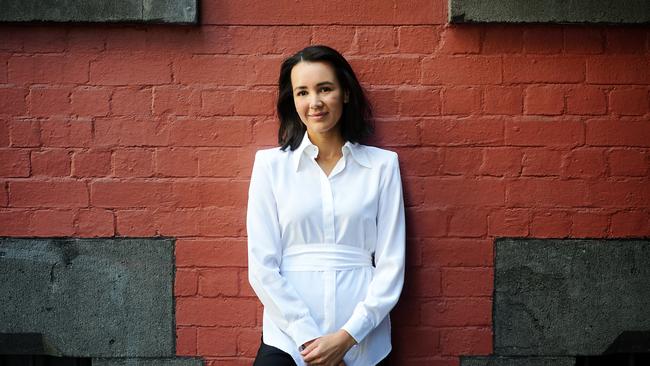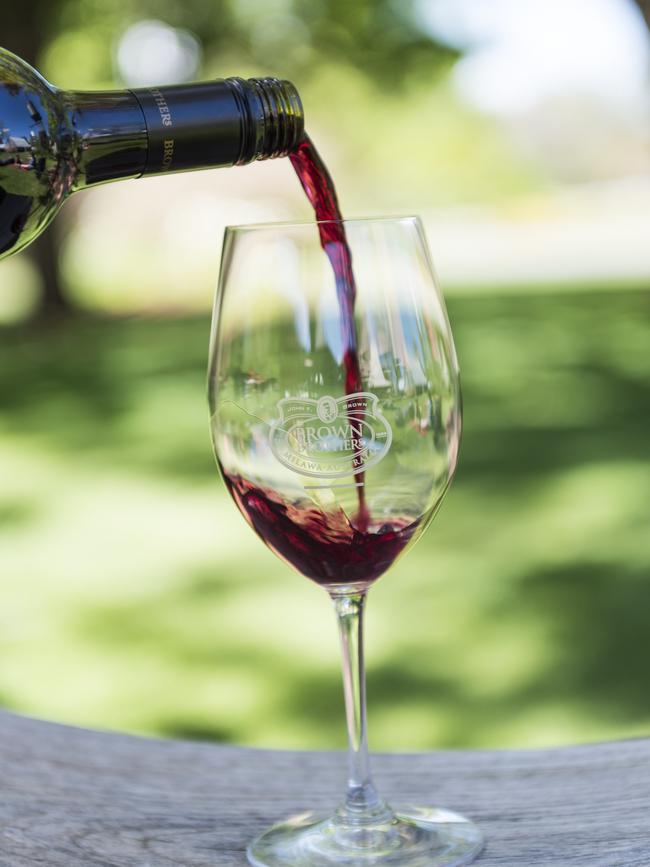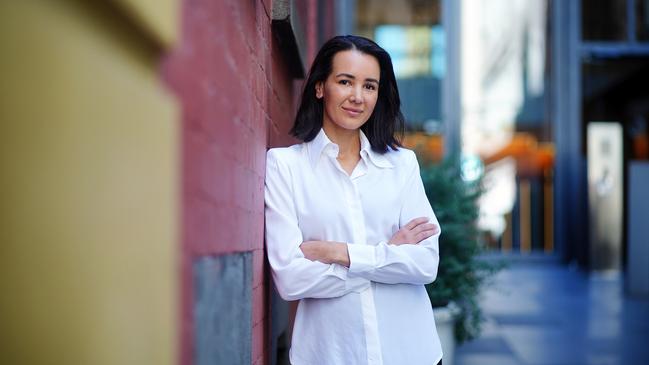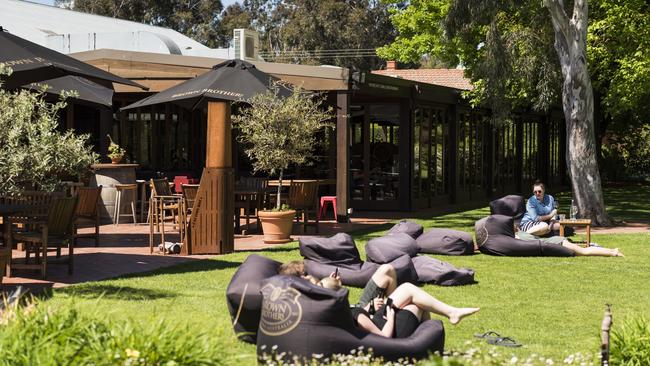Wine dynasty departure that moulded a mental health crusade
Pip Brown was born into a winemaking dynasty but childhood anguish led her in a different direction – and she’s channelled that pain, and technology, to help fill a need in the mental health field.

Phillipa “Pip” Brown lost her father, Roger, to brain cancer when she was just two years old.
More than three decades on, in moments like these, the reality of her loss is still raw.
“I don’t really have a lot of memories with him. But I think the void was something that was very prominent with me growing up,” she says, before politely apologising as tears momentarily well in her eyes.
We are sitting in a crowded Melbourne restaurant, so I invite her to relax and take her time as she reflects upon a time of her life from which the pain runs deep.
After a pause she continues momentarily: “I think it was more like it hit me later in life.”
Again, she struggles to compose herself, before exclaiming with a wry smile: “But I’ve had so much therapy!”
Finally, after a deep breath, she reflects upon leaving school and moving, at the age of 18, from her Melbourne home to study at Bond University on the Gold Coast.

“It is actually really common for a child to experience the loss of parents later on. When you are in those teenage years is the time that you most commonly would develop mental health issues,” she says.
“So that was the time that it really did start to hit me and I started to develop some issues around, ‘Why did this happen to me?’
“When I had family support I felt like we were a unit. Then once I moved away for university, I felt really alone and I suddenly started to feel all the voids. When you don’t really have your support system around you it is really, really tough.”
Brown’s family is part of Australian wine industry royalty.
Brown Brothers, Australia’s most successful medium-sized winery still in family hands, was founded in 1889 by her great grandfather, John Francis Brown, near the Victorian town of Milawa nestled on the Oxley plains on the edge of the Australian Alps.
In 1978 her grandfather, John Charles Brown – who joined the business in 1934 and became managing director and then chairman – split the ownership with his four boys, giving the family of one sone, Roger, family 20 per cent of the fortune.
Back then John’s eldest son, John Graham Brown, was the winemaker (and from 1988, CEO), Peter a viticulturist, Ross the marketer and Roger the horticulturist.
After Roger’s passing in 1990, his three elder brothers bought out his share of Brown Brothers, crystallising a small fortune for Pip, her elder sister Stephanie and their mother, Elu.
But today it is worth tens of millions more.
Pip Brown has never resented being given no choice to give up an ongoing interest in a true Australian icon, which today is known as the Brown Family Wine Group.
But she now knows a lot more about the struggles of her family during her youth.
Her father was often gone from the family home at Miliwa for long periods to access the treatments he required in Melbourne, three hours’ drive away.

Her mother struggled raising two kids while her husband was gravely unwell, without access to the specialist mental health services then only available in the city.
Tragically Elu had no psychological support while administering palliative care to her husband at home during the final months of his life.
Then, while living in Brisbane, Pip Brown herself tried in vain to find a psychologist who could help her deal with her grief. In one clinic she felt so uncomfortable she simply walked out.
It was only when she was reunited by phone with her Melbourne-based psychologist, who she had first seen when she was in year 8 at school, that she felt comfortable and back in control.
These experiences inspired her to start her own telehealth psychology practice. Launched last year, it is called MeHelp Psychology (Help me spelt backwards), offering fully online mental health support.
Brown, who turns 36 this year, now has four tertiary qualifications in the field: a master’s degree in professional psychology, a bachelor of psychology degree, a graduate diploma of psychology and a master’s degree in counselling.
“Although the health services have improved in regional areas, today there are still huge limitations for those living outside of major cities to access healthcare,” she says.
“This gap in the market related to mental health was the opportunity I saw to make a difference and utilise my professional qualifications and expertise to make change for the better.”
Fulfilment and purpose
Brown, who has two children under three, cannot begin to imagine what her mother went through in the early 1990s bringing up two kids on her own.
Born in Italy before growing up in New York, her mother gave up a modelling career to marry Roger Brown and move to Australia to live in regional Victoria.
“She lost her husband at the same age that basically my kids are now and I could not imagine going through that while also living in the country,” her daughter says.
Having English as her third language after Spanish and Italian, Elu initially returned to her Italian roots by moving her girls to Rome for a year in 1991, before bringing them back to Australia to be closer to family. They settled in Melbourne.
Brown says her mother has always been her rock.
“She’s the strongest woman I’ve ever met. She helped me become the woman that I am today and I wouldn’t be here, as strong as I am, without her. She’s amazing,” she says proudly.
Her grandparents, wine industry legends John Charles Brown and Patricia Brown, also played an important role in her upbringing before they died within four months of each other – both at the age of 89 – in 2004.
The Brown Family Wine Group’s finest wine range is now named after Patricia, the family matriarch who dedicated 60 years of her life to the company.
Tragedy hit the Browns in November 2005 when then 60-year-old Peter Brown died after his motorbike collided with a four-wheel-drive towing a horse float at Benalla in northern Victoria.

Pip Brown called him Uncle “Tricky” Peter and was always close with his children – her cousins Nick, Angela and Eliza.
“We definitely understood each other even more after the passing of their father. I call Eliza my mentor, she’s been one of my biggest supporters. She helps me through everything. So she is the first person I call for anything good or bad,” Brown says.
Peter Brown also ran his own vineyard, All Saints, at Wahgunyah near Rutherglen.
“So his children had to take over that very suddenly. They had the opportunity to just sell it, but they were like, ‘Let’s do it’,” she says,
“They have just done the most incredible job and watching them flourish and do everything they do is just amazing.”
For more than 30 years the Browns have lived by a code that children in the family must have four years’ external experience before they enter the business and must be able to make a contribution. They also must not be paid more than market value.
Pip Brown was never bothered by the rule. She says she could have shown an interest in the joining the business, gone to university and studied something wine related.
But deep down she always wanted to be a psychologist.
“Being a part of the family, you can feel a lot of pressure to go into certain roles. You might not have the opportunity to think that there are some other options out there for you,” she says.
“So I feel actually quite lucky that I’ve been able to go out and find something that I really enjoy. I really find fulfilment and purpose in what I’m doing.”
Treading her own path
At Bond University in 2007 Brown met a male student a year above her who was studying entrepreneurship. His name was Lewis Romano, best known as the co-founder of both ASX-listed digital debt collector CreditClear and online recruiter SpotJobs.
After being friends for a decade and a half, they were married in 2021. Romano has just launched a new tech firm called ViewJobs, which he wants to become a regional competitor to the $9bn listed online jobs giant Seek.
But like his wife, the entrepreneur has also been wrestling with his own demons after his best mate, businessman James Casey, died suddenly in New York in September 2022.
The 26-year-old suffered from type 1 diabetes but went on a night out without his insulin. James was the son of Melbourne property tycoon Mark Casey and was working in New York for his father’s company, Casey Capital.
Brown had to use all her psychologist skills to help herself, her husband and their friends cope with James’ untimely death.

“That was really challenging. I think sometimes when someone loses someone, they might think that they are okay. But I think deep down, there’s obviously a void, there’s someone missing in their life. That can come out in all sorts of different ways,” she says, stressing her husband also received independent psychological support.
Brown and Romano decided to move to Byron Bay in March 2023 to make a fresh start.
“James’ passing wasn’t the main reason why we moved because it was actually business opportunities. But it was a really great opportunity to have a different perspective on life and do something different. It has absolutely changed everything,” she says.
She now wants to play her part in tackling an escalating mental health crisis in Australia, especially in regional areas.
MeHelp has 30 psychologists on its books and Brown says its growth will be driven by data.

We want people to let us know and lead us as to what they need,” she says.
“At the moment, people are really looking for more immediate support, more resources, more self-care strategies. You can have a session once a week or once a fortnight, but we are really looking for what happens in between.
“How do we keep people accountable? How do we keep them engaged? So we have a really clear road map as to what that looks like,” she says, noting the firm is optimising its website and introducing new features to meet customer demand.
It comes ahead of an expected period of consolidation in the industry, especially with the introduction of new technology.
But Brown says that despite the rapid evolution of artificial Intelligence, MeHelp will always adopt a “purely humanistic” approach in offering mental health support.
“So every time you speak to someone, you speak to a human. You always talk to a psychologist. All of our triaging specialists are also human,” she says.
“We don’t do any surveys, because we don’t want you to have to go through any process. We are actually building out our triage team now because there’s a lot more demand. Our frontline, first point of contact people are our most important.”
Brown’s favourite wine is the famed Tamar Ridge pinot noir from Tasmania’s Tamar Valley, a flagship product of the wine company that still bares her name.
Despite having lost her financial stake in the next stage of its evolution and taken a different path in her life, she will be forever proud of being a Brown. And, while she barely knew him, her father’s beloved daughter.
“Going back to Milawa and understanding all the history from when the wine business first started to what it is today, I love it. I love learning about it. I’m constantly learning new things every time I go back,” she says.
“I’m really proud of that family legacy with such a long standing history. It really is amazing how much is documented about my family. It is a really beautiful, interesting story.”






To join the conversation, please log in. Don't have an account? Register
Join the conversation, you are commenting as Logout